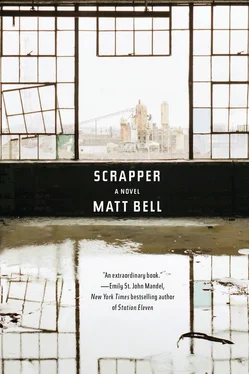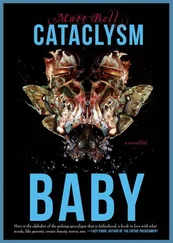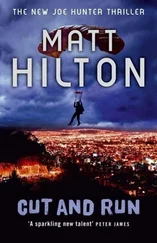Is this from the gym? she asked. Don’t you wear gloves?
He said, Gloves and helmet. Mouthguard. Hand wraps and taped ankles.
He said, The gloves protect the other person. Not the striker but the one struck. Every punch you throw opens you up. You have to be willing to hurt yourself.
Be careful, she said. You’re not young anymore. We’re not young together.
She said, What will happen to me could happen any day and I can’t do anything to stop it. But this is something you’re choosing.
She wasn’t wrong. He had begun wearing the watch’s orange jersey underneath his other clothes, its mesh scratchy against his skin, under flannel or sweater or sweatshirt. He hadn’t expected there to be so much power in the bright fabric but its intention clung to its flesh, authorized his vigilance. Now the jersey stunk no matter how he washed it, its material discolored under the armpits and around the neckline. He rinsed it every night in the sink but too often he put it back on before it was fully dry, wrapping himself in the smell of laundry soap, unscrubbed sweat.
He hid the jersey from the girl, felt more naked than ever when he removed it in the secretive dark of the bedroom. She was worried enough, already had her reasons. There was a space growing between them, the case shortening his days and nights, constraining the chances for him to be with her, the attention she received. He thought he would make it up to her soon, ask her to move in or to move to a new place together, somewhere they’d have no previous history. A new beginning. He would ask her soon but not until he closed the case. He wanted to be with her but he didn’t want the case to come along.
How to protect yourself from the blow you can’t see coming. This was what the other boxers talked about, beside the mats, in the locker room, while lifting heavier quantities of dull-black weights over their heads, straining thighs and calves and backs and shoulders. Chalk everywhere, on their hands and arms, the floor and the benches, and always the same topic: how to protect yourself from the invisible blow. Because it was the blow you couldn’t see coming that knocked you out. If you stared into every punch you could never be put down. The illusion of control. Self-determination in battle. Kelly didn’t believe in anything else he’d once believed in but he thought he might believe in this. To stop escaping what was coming. The recognition of the inevitable, the way a boxer’s knees might be buckling before the blow landed, the eyes rolling back, the mouth slacking open to utter some last dumb sound.
In the morning the trainer approached Kelly in the locker room to pitch the fight, Bringer’s first. The trainer said he would train them both, with his assistant serving as Kelly’s corner man. There was no conflict of interest because no one — not the contender, not the trainers, perhaps not even Kelly — actually expected or wanted Kelly to win.
I think you’re wrong, Kelly said. I could beat him.
No, the trainer said. But I want you to think so. I’m betting on you believing.
Kelly shook the trainer’s hand, saw how the trainer knew the truest shape of his heart. His ability to keep fighting even after he’d been hurt. How even if he knew he would be hurt badly it didn’t mean he wouldn’t fight back, wouldn’t push against every fist in the world. Always he had left behind what he’d done by giving up the portion of himself it lived within. With enough versions of himself he might compartmentalize anything. Diminishment could be a path to action and if Bringer did nothing else he might diminish what little resistance remained.
The boy wakes up in the middle of the night. A nightmare. He’s back in the blue house, back in the basement. But this time it’s not the man in the red slicker in the chair. This time it’s the brother.
The boy’s ankles are handcuffed to the bed. He can move but he can’t leave.
He is naked but there is a blanket covering him. His body exposed but hidden.
He waits quietly. This is the brother. He is not in danger.
But then the brother says, Watch me.
The brother says, Watch this.
He says, Boy, just watch, and then the boy watches. The brother walks away from the bed, into the dark corners of the room. He’s looking for something but the boy can’t see what.
But I can. He’s donning the red slicker, slipping inside it one arm at a time.
When the brother comes back into the light the boy starts to scream.
And then whose dreams are these.
The man in the red slicker — is he a person or an action? An action that until I found the boy I had never been able to name?
Who do I see when I picture the kidnapper?
Anyone I can put inside a red slicker.
W
Once upon a time the brother claimed a calendar’s worth of extracurriculars but I cannot find the evidence. If the brother was on the basketball team, then there would be practices, games, public places to surveil from within a crowd. But if these events existed they were without schedule or record.
Despite these mysteries, the brother is not impossible to track and so I track him.
I follow the brother’s brown car, memorize its license plate. The same model as the man’s in the red slicker, an accidental overlap with dire consequences. The boy’s false schedule buys him freedom behind the wheel, access to all the city from school’s end to curfew, eleven on the weekdays, midnight on Saturday. The brother’s friends are not indistinguishable but at this distance I know them only by their grossest types: there is the fat one and the tall one and the thin one, each more similar than distinct. Always the brother drives, the others fighting for shotgun and the losers crowding into the backseat.
Together they visit certain houses in the zone. The brother stays in the car while the fat one goes inside. I hang back but afterward I roll by the houses again, scan the metal screens over the windows. The game the brother’s playing isn’t basketball but I think I know the rules.
The brother and the brother’s friends drive the neighborhood closest to their school, stop to pick up girls from front porches. They smoke in the car, keep the windows rolled up for blocks before letting the world back in. I think I can hear their laughter but I know I’m not close enough. I never had these kinds of friends but I was once young and dumb too, know the story, know these girls with bad taste.
I watch while the brother and these others get high in his car, get high in lots between abandoned houses, then high in the houses. At first I maintain my distance, stay down the block in the truck. The brother knows my face but the brother never sees me. The obliviousness of youth is all the cover I need. I leave the truck behind, walk into the small trees circling the house the boy and the friends and the girls have found, approach it from the back. I can’t get close enough to look through the windowless walls but I can hear the sounds of laughter from the first floor, then the brother’s voice upstairs, then the sounds of him with one of the girls. A girl, yes, but a girl is not adequate cover. Not proof of anything. There had been girls for me too. There is a girl now and I know better than to believe it means the past is ended.
The brother going to school but not staying all day. The brother cutting out early, leaving at lunch and not coming back. Or else not going at all.
The brother sitting in the fast-food restaurant where the fat friend works, hanging out in the backmost booth. Not buying anything. Sitting there drinking a soda. Thumbs on his cell. Bored but nowhere to go.
Читать дальше












